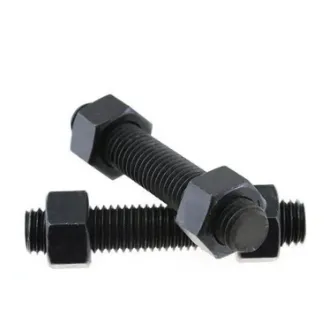torquing bolts
فروری . 02, 2025 05:33 Back to list
torquing bolts
Torquing bolts is a critical process in various industries, ranging from automotive to construction, where precision and safety are of utmost importance. Ensuring that bolts are torqued correctly can be the difference between the success and failure of a project. This article elucidates the essentials of torquing bolts, providing expert insights and authoritative advice on achieving reliability and accuracy.
To further enhance the reliability of torquing, cross-checking and verification can't be skipped. Many seasoned technicians suggest a methodical double-check approach, whereby a secondary technician re-verifies the applied torque. This practice not only minimizes human error but also instills a culture of accountability and trustworthiness in the workplace. A common mistake observed in the field is the assumption that once a bolt has been torqued, it remains in its optimal state indefinitely. Real-world experience teaches us that external factors such as vibration, thermal expansion, and physical forces can alter the tension in bolted joints. Regular inspections and retorquing, when necessary, are therefore indispensable components of maintenance protocols. In the product realm, bolted joint technology is seeing innovations aimed at improving torquing accuracy and efficiency. Automated torquing systems are gradually being implemented in manufacturing environments to eliminate human error. Moreover, smart fasteners capable of relaying real-time data about their tension state represent another leap forward, allowing for predictive maintenance and reducing downtime. In conclusion, torquing is not simply about applying force; it's a precise science requiring a combination of knowledge, skill, and optimal tools. By fostering a culture of diligence and precision around this seemingly straightforward task, industries can prevent costly failures and maintain the highest standards of safety and performance. Whether you're an engineer, mechanic, or DIY enthusiast, respecting the principles of torquing bolts can lead to more sustainable and reliable structures and machines.


To further enhance the reliability of torquing, cross-checking and verification can't be skipped. Many seasoned technicians suggest a methodical double-check approach, whereby a secondary technician re-verifies the applied torque. This practice not only minimizes human error but also instills a culture of accountability and trustworthiness in the workplace. A common mistake observed in the field is the assumption that once a bolt has been torqued, it remains in its optimal state indefinitely. Real-world experience teaches us that external factors such as vibration, thermal expansion, and physical forces can alter the tension in bolted joints. Regular inspections and retorquing, when necessary, are therefore indispensable components of maintenance protocols. In the product realm, bolted joint technology is seeing innovations aimed at improving torquing accuracy and efficiency. Automated torquing systems are gradually being implemented in manufacturing environments to eliminate human error. Moreover, smart fasteners capable of relaying real-time data about their tension state represent another leap forward, allowing for predictive maintenance and reducing downtime. In conclusion, torquing is not simply about applying force; it's a precise science requiring a combination of knowledge, skill, and optimal tools. By fostering a culture of diligence and precision around this seemingly straightforward task, industries can prevent costly failures and maintain the highest standards of safety and performance. Whether you're an engineer, mechanic, or DIY enthusiast, respecting the principles of torquing bolts can lead to more sustainable and reliable structures and machines.
Next:
Latest news
-
Top Wire Bolts Company: Manufacturers, Exporters & Suppliers
NewsAug.10,2025
-
Premium Cabinet Bolts Supplier - Quality & Wholesale Fasteners
NewsAug.09,2025
-
Reliable Cabinet Bolts Supplier | Quality & Bulk Fasteners
NewsAug.07,2025
-
Wire Bolts Suppliers & Manufacturer | Factory Direct Price
NewsAug.06,2025
-
Premium Wire Bolts Suppliers | High-Quality Bolts
NewsAug.05,2025
-
Trusted Wire Bolts Suppliers - Durable & Reliable Solutions
NewsAug.04,2025
